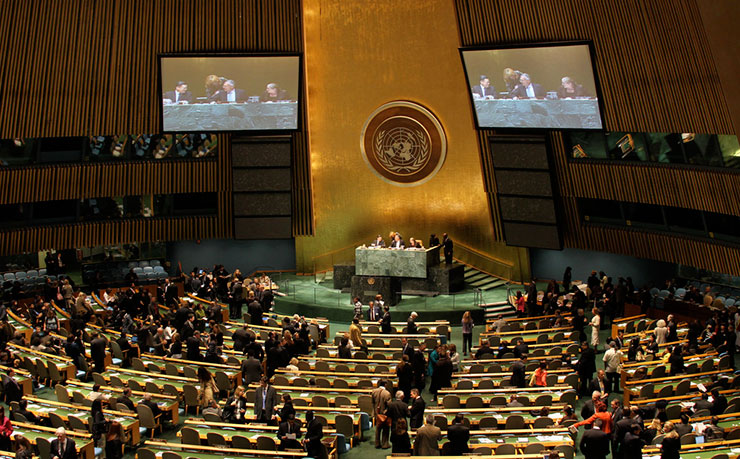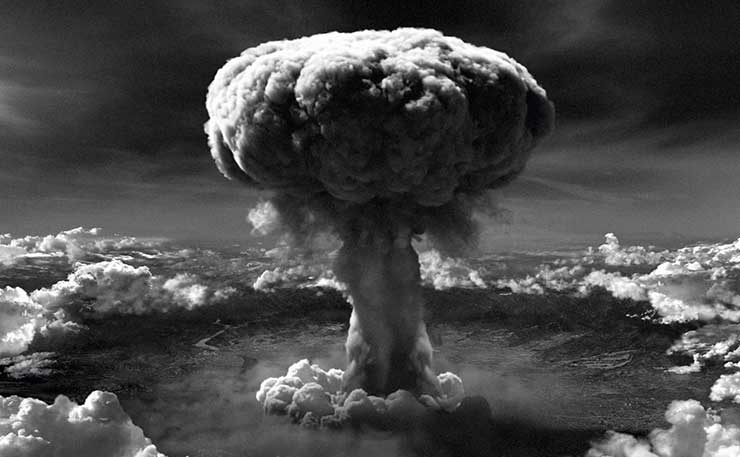A global push to save the world from a nuclear armageddon has the backing of more than 120 nations. Australia isn’t one of them. Rewena Mahesh explains.
On July 7, a global treaty was adopted at the UN General Assembly to prohibit nuclear weapons. This treaty now sets precedence for a powerful norm that will change the course of history by helping promote disarmament and preventing further proliferation.
This treaty closes a large international law gap, by prohibiting states from developing, testing, producing, manufacturing, transferring, possessing, stockpiling, using, or threatening to use nuclear weapons once ratified by 50 states.
That will happen tomorrow, on the 20th of September.
Despite an overwhelming 122 countries endorsing the treaty, strongly and actively supported by hundreds of civic society organizations including the World Medical Association, Medical Association for Prevention of War, the World Federation of Public Health Associations, nine member countries that possess nuclear weapons and most NATO allies boycotted the agreement.
Shamefully, one of those countries absent from negotiations and which played a role in boycotting the treaty is Australia. We fall under the nuclear protection of the USA.
While Australia, possesses no nuclear weapons, it is a major producer and supplier of uranium used in the production of nuclear arsenals for the US and British military and most recently Russia, China and India.
Australia has had a long history with nuclear testing, hosting the British in the 1950s and 60s to conduct 12 major nuclear tests which dispersed radiation across much of the continent. In particular site workers and Aboriginal communities nearby have been suffering the consequences of radiation, seen in high rates of cancer with very little compensation, and a lack of capacity to use traditional land due to contamination.
As a result of Australia hosting the US military and intelligence facilities, such as Pine Gap near Alice Springs, we are offered protection in the face of a nuclear threat, under the extended nuclear deterrence, and thus consider nuclear weapons to be legitimate, useful and necessary despite their devastating and catastrophic effects.
With the current escalating tensions between North Korea and the USA, where nuclear weapons are at the hands of unstable and unpredictable political leaders, the dangers of a nuclear war occurring at any given moment is frightening.
The health consequences of a nuclear war are catastrophic and can decimate the lives of countless people, animals, and have devastating environmental impacts.
Evidence demonstrates that even a limited exchange of nuclear weapons could place up to 2 billion people at risk of mass starvation as a consequence of disruption in the climate and agricultural production around the world. Catastrophic results would then follow from radiation exposure, causing acute and long-term illnesses particularly cancers, leaving behind a legacy of intergenerational health damage.
Not only does it cause devastating health impacts, it will also create a refugee crisis larger in magnitude than the one seen today and will destroy any physical and social structure that would not be recoverable.

Despite the enormous negative effects of nuclear weapons, the Australian government oppose the treaty for several reasons. The first being that the treaty ignores the current geopolitical reality that is the current volatile and dangerous environment such as the nuclear tests and missile launches undertaken by North Korea.
Secondly, it argues that the new treaty will not reduce nuclear powers given that none of the countries with nuclear weapons are in support of the treaty, creating an inequality between those with and without nuclear weapons.
Furthermore, they argue that Australia is sheltered by the US nuclear umbrella which provides vital deterrence and protection. The view and solution of the Australian government is that of a progressive “building block approach” with initial steps calling for an increase in transparency regarding nuclear stockpiles among countries that are in possession of them.
The failure of the nuclear powers to disarm an estimated 15,000 nuclear weapons at their disposal has heightened the risk that other nations will one day acquire and use nuclear weapons.
Given the current volatile environment with unpredictable leaders, the only guarantee we have against the spread and use of nuclear weapons is to eliminate them completely.
Indiscriminate weapons such as landmines, biological and chemical weapons, and cluster munitions which have all been permanently banned are increasingly accepted as illegitimate, and are losing their political status.
It is thus difficult to acquire resources for the production and modernisation of a prohibited weapon by companies or governments. It is then hoped that by eliminating nuclear weapons, this forms the new norm globally and they too will lose their legitimacy and political status in due course.
Nuclear weapons are also an ineffective means of combating almost all issues globally and nationally, such as cyber warfare, climate change, poverty, antimicrobial resistance etc.
The International Campaign to Abolish Nuclear Weapons (ICAN) showed that 84 per cent of Australians surveyed wanted the government to support the efforts of a treaty to ban nuclear weapons. Australia still has the opportunity to be on the right side of history by signing the treaty tomorrow.
Australia needs to be at the forefront of global efforts to eliminate nuclear weapons and not be misled by the notion of extended nuclear deterrence under the protection of the US.
Australia needs to look across the Tasman to its neighbour New Zealand, which for decades has remained an ally of the US, but has had an independent foreign policy.
Instead of blindly aligning ourselves with the nuclear policies of the US, Australia needs to consider the devastating health and social consequences of nuclear weapons and sign the treaty to increase credibility in the region and make the world a safer place.
Donate To New Matilda
New Matilda is a small, independent media outlet. We survive through reader contributions, and never losing a lawsuit. If you got something from this article, giving something back helps us to continue speaking truth to power. Every little bit counts.







